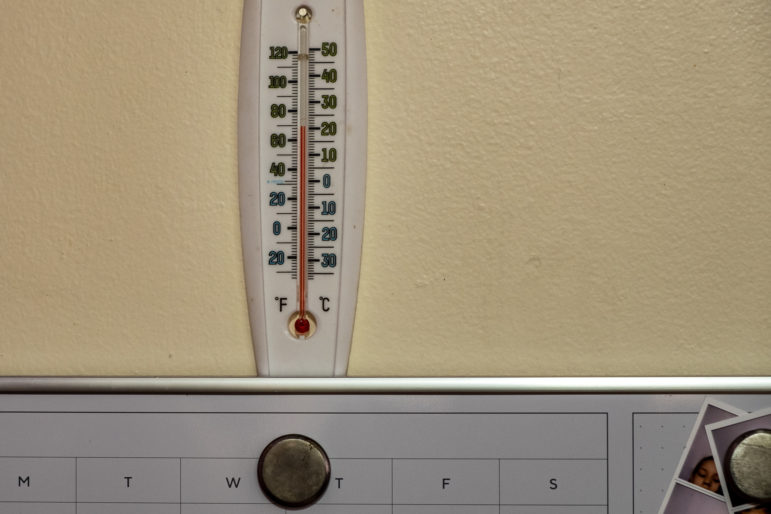When morning broke on November 4, six Democratic incumbents representing parts of New York City were trailing in their re-election races. Five appear to have survived.

Adi Talwar
Poll workers sit behind a plexiglass barrier at P.S. 65 on Staten Island.Slowly and quietly, the loose ends from New York City’s Election Day are getting tied up, although it could be 10 days before the door officially closes on campaign 2020.
When morning broke on Nov. 4, six Democratic incumbents representing parts of New York City were trailing in their re-election races. Congressman Max Rose was well behind Republican Assemblywoman Nicole Malliotakis in the Staten Island-Brooklyn 11th district, while Rep. Tom Suozzi trailed Republican George Santos in the 3rd district, which bridges Queens and Nassau County.
State Sen. Andrew Gounardes faced a 6,000-vote deficit against Republican Vito Bruno in southern Brooklyn. And in the Assembly, incumbents Edward Braunstein, Michael Cusick and Mathylde Frontus were all lagging their challengers.
It now appears that Rose, who conceded his race last week, was the only blue casualty of the cycle in the five boroughs. (Outside the city, Long Island Democrat Monica Martinez lost her State Senate reelection bid, Democratic Senators James Gaughran and Kevin Thomas eked out wins, and the fate of Democrats Anthony Brindisi, a Congressman, and Pete Harckham remained uncertain).
Santos conceded to Suozzi on Tuesday, according to the Queens Daily Eagle, after a 4,000-vote election night margin for Santos turned into a 10,000-vote deficit after mail-in ballots were counted.
Gounardes declared victory on Wednesday. No official numbers have been released by the New York City Board of Elections in his or any other race—the board will not offer final word until the results are certified on Nov. 28 (or Nov. 30, since the 28th is a Saturday)—but Gounardes says he now leads by a margin of 50,650 to 47,152. Bruno did not return a request for comment.
In the 26th Assembly District rooted in Bay Terrace and Little Neck in Queens, Braunstein—who trailed by 1,700 votes on Nov. 3—now claims a lead of about 5,000 votes. His opponent, John-Alexander Sakelos, did not return a call seeking comment.
On election night, Mark Szuszkiewicz led incumbent Mathylde Frontus by 2,700 votes in the 46th Assembly district, which covers Coney Island and other parts of the Brooklyn coast. On Wednesday, Frontus declared victory, predicting that her slim lead of 483 votes would grow as final ballots are counted.
Friends! We did it! Would not have made it without the voters of the 46th District coming through. Thank you for your support. I’m eternally grateful. pic.twitter.com/cUhWxslvsk
— Mathylde Frontus (@FrontusforNY) November 19, 2020
In a social media post, Szuszkiewicz—while repeatedly insisting he was not alleging fraud had occurred—indicated he was puzzled by an increase in the number of absentee ballots in the race from an initial estimate of 5,000 to 9,000. He acknowledged the likelihood of defeat but said he would call for an investigation of any suspected improprieties even if they would not change the outcome.
“With my opponent receiving about 70 percent of the votes of the paper ballots it’s not looking good for me. I doubt that there was enough voter fraud to cause the margin that it is now but that’s not the point. Even if there was only one vote that was fraud it needs to be investigated and the person needs to be prosecuted to send a message that voter fraud will not be tolerated. Mailing in a dead parents absentee ballot or any other instance of fraud should not be tolerated,” he wrote. “If the current lead is reduced to around 200 by the remaining ballots that would trigger a recount. Again I’m not claiming that fraud was the reason but I’m informing everyone of the current situation.”
Staten Island’s Cusick—who has served in the Assembly since 2003 and is the chair of the Richmond County Democratic Committee—ended election night down by about 1,200 votes to Anthony DeGuerre. According to Cusick’s campaign, the unofficial tally is now 28,768 for Cusick to 25,732 for DeGuerre.
DeGuerre conceded the race last Friday. “Earlier this year, I committed to running a vigorous campaign to ensure that Republican and conservative values are represented in our community. While my team and I were encouraged to have led among the votes cast in person in this race, it has become apparent that the thousands of absentee ballots cast in this election will favor my opponent by enough of a margin that I will not be the winner,” he wrote, adding that he had called Cusick to congratulate him.
Does the fact that so many Democrats faced suspenseful races raise questions about the party’s messaging and strategy? Much of the drama was created solely by the large percentage of mail-in ballots this year, which delayed results that normally would have registered on election night. But Braunstein won his previous race by a nearly 2:1 margin, and Cusick ran unopposed last time, so their 2020 victories could be considered close.
The Trump phenomenon clearly loomed large: the president won big in Rose’s district and in Cusisk’s, and narrowly outpolled Joe Biden in Frontus’ and Braunstein’s.








